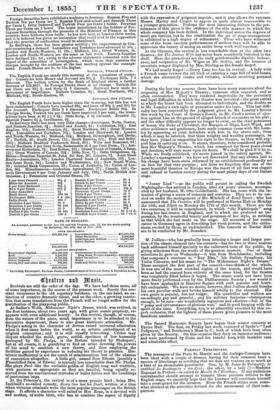ittbratrto nut Muir.
Revivals are still the order of the day. We have had three more, all of some importance, in the course of the present week. Surely this con- stant recurrence to the old repertory betokens, on the one hand, an ex- tinction of creative dramatic talent, and on the other, a growing convic- tion that mere translations from the French will no longer suffice for the gratification of the playgoing public. -
At Sadler's Wells, Midsummer Night's Bream, which was revived, in the first instance, about two years ago, with great scenic propriety, re- appears with even additional beauty. In this revival, though, of course, from the nature of the piece, much importance is to be attached to the decorative department, there is also great histrionic attraction. Mr. Phelps's acting in the character of Bottom raised universal admiration when it first came before the world, as an artistic embodiment of an original conception; and it is still equally interesting. Critics may dispute whether the stolid, grave, sottish specimen of low humanity portrayed by Mr. Phelps, is the Bottom intended by Shakspere; but at all events, it is gratifying to find an artist devoting the powers of his mind to establish a new theory, and then employing the facilities gained by experience in reducing his theory to practice. His- trionic inefficiency is not the result of misconception, but of the absence of conception altogether. A little girl, named Rose Edouin (possibly a Frenchified form of Edwin) is scarcely less remarkable than Mr. Phelps. She plays Reek like the veritable goblin of English song and tradition, with gestures as appropriate as they are fanciful, being equally re- moved from the conventional attitudes of ballet fairies and the tumblings of pantomime imps. At the Princess's, the revival is of a more prosaic kind ; being Mrs. Inchbald's so-called comedy, Every One has his Fault, written at a time when virtuous criminals were the most popular personages on the British stage. It affords a character well suited to Mrs. Kean, in a devoted wife and mother, of noble birth, who has to combine the aspect of dignity with the expression of poignant anguish ; and it also allows the veterans Messrs. Harley and Cooper to appear in parts almost inaccessible to a younger generation. Perhaps the most interesting feature in the per- formance of this piece is the evidence of the able manner in which the whole company has been drilled. In the individual actors the degrees of merit are various, but in the combination the art of stage-management is exhibited to a high degree of refinement. Those who have witnessed some of the loose careless performances of modern days will be able to appreciate the luxury of seeing an entire troop work well together.
At the Olympic, the revival is less remarkable than at the other two theatres; for The Jealous Wife has never been completely banished to the shelf. Here the attractions are the truly gentlemanlike dignity, forbear- ance, and resignation of Mr. Wigan as Mr. Oakley, and the nuances of uncertain temper displayed by Mrs. Stirling as the female despot.
We had nearly forgot !—Drury Lane too has its revival. A lady with a French name revives the old trick of entering a cage full of wild beasts, which she alternately coaxes and irritates, without receiving personal damage.


























 Previous page
Previous page